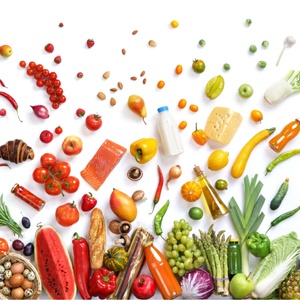Blog
Welcome to FaceForward
Get the scoop on all things beauty, wellness, and skincare.

There's a lot that goes into having clear, beautiful skin, exercise to a good skincare routine. But much of health and beauty ultimately circle back to diet and wellbeing too.
Your body needs the right building blocks to look and feel as good as you want. As a starting point, it's essential that you get sufficient macronutrients, like healthy fats and protein so that your body can create and maintain skin cells and sub-surface matrices like collagen. Then, micronutrients like vitamins and minerals come into play, with sufficient intake key to supporting skin physiology.
Are there certain vitamins your skin needs to look its best? Here’s the rundown.
There's no single food that contains everything you need for clear skin. However, there are many foods that contain one or more of the most important compounds for good skin health. Whether you're a vegan, vegetarian, gluten-free, or not on any specific diet, you can still find all of the vitamins your skin needs in the food you eat.
Vitamin A may be the most important vitamin for whole-skin health and appearance. It's an important component of the outer and inner layers of skin, where it helps maintain and protect the collagen that gives your skin its elasticity and fullness. In particular, vitamin A disrupts the process by which oxidization, UV damage, and other sources can cause collagen to break down. It's also worth noting that adequate levels of vitamin A help to reduce risk factors for skin cancer.
When talking about sources of vitamin A, there are two types of foods to consider. Eggs, yogurt, liver, and other animal products contain the actual vitamin. However, many fruits and vegetables contain a compound that your body can easily convert into vitamin A. Sweet, yellow fruits such as mango and papaya as well as leafy greens and red vegetables tend to be good sources of vitamin A. Meet your need for vitamin A by eating foods such as:
People have long appreciated the necessity of vitamin C to protect the skin and other soft tissues, ever since sailors began traveling the sea with oranges and limes to prevent scurvy. This is because vitamin C is essential to maintaining the integrity of your skin's collagen. Without this little compound, your body won't be able to undertake the processes that patch up scratches and sores or maintain healthy skin. Furthermore, vitamin C has a potent antioxidant effect that helps protect the skin from UV damage and other risk factors.
You can find vitamin C in many different fruits and vegetables, particularly citrus fruits and berries. One of the best ways to add some extra vitamin C to your diet is by eating avocado, whether you prefer guacamole or avocado toast. Not only is it delicious and rich in vitamin C, but it also contains high concentrations of healthy, unsaturated fats that give skin a radiant glow and maintain elasticity. Just a few of the many sources of vitamin C in diet are:
Vitamin E is a potent antioxidant that protects your skin from many sources of damage. Having a healthy level of vitamin E in your diet helps prevent wrinkling and drying by boosting your skin's natural resilience. You can find vitamin E in many plant-based food products, particularly in oil-rich foods such as pumpkin and nuts. Peanut butter is another excellent source of vitamin E, as it's also rich in healthy fats and protein that support good skin health. Other great sources of vitamin E to consider include:
Zinc functions almost like a shield for your skin in the way that it contributes to the strength and health of your outermost layer. The outer layer of skin has about five times as much zinc as the lower layers, which speeds up the healing process and stabilizes cell walls. This stabilization helps skin cells remain healthy and divide as needed, which allows sores and scratches to close quickly and cleanly.
Fortified breakfast cereals tend to have reasonable concentrations of zinc, but it's also easy to fulfill your dietary needs for zinc by eating poultry or pork. Oysters are the most zinc-rich food by far, but vegan and vegetarian options also offer the mineral in abundance. Whole grains, beans, and nuts contain more than enough zinc to satisfy your dietary needs.
Selenium doesn't do much on its own, but it helps other antioxidant vitamins and minerals perform more effectively. If you're already meeting your needs for other skin-healthy nutrients, adding selenium may amplify the effect in a way that simply consuming more nutrients won't. Since it helps antioxidants work more effectively, this mineral helps protect your skin from UV radiation damage by protecting cell walls.
Selenium may be the hardest skin-health mineral to consume for people with dietary limitations, as the most common sources are poultry, pork, fish, eggs, yogurt, and whole grains. However, so long as you lack an allergy to nuts, you can easily exceed your daily requirement for selenium by eating Brazil nuts. A single Brazil nut is so rich in selenium that it will provide about double your daily requirement!
Unless your nutritional intake is atrocious, vitamins and diet changes aren’t likely to transform your skin on their own. But they’re a great supporting element, and if you're dealing with deficiencies in the above nutrients, upping your intake can have a big effect.
For most people, great skin requires a great skincare plan.
That’s where Nava MD comes in, with custom prescription formulations to tackle conditions like acne, scarring, rosacea, and even combat wrinkles. Our formulations are customized to the individual, and serums are delivered by mail if prescribed. It’s fast, affordable, and easy – click here to get started with our free online consultation.
This article is intended for informational purposes only and should not be considered medical advice.
Consult a healthcare professional or call a doctor in the case of a medical emergency